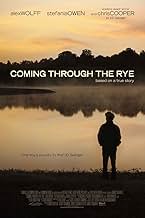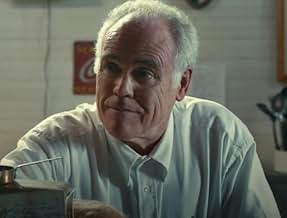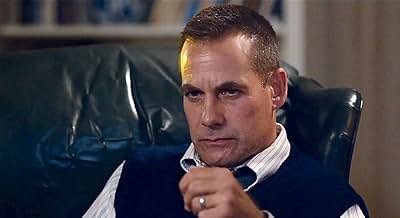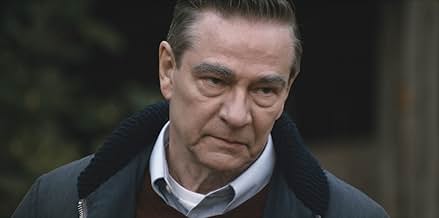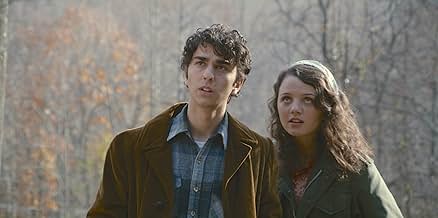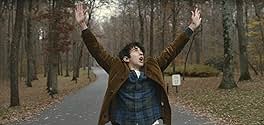CALIFICACIÓN DE IMDb
6.3/10
1.1 k
TU CALIFICACIÓN
Agrega una trama en tu idiomaIn 1969, the Holden Caulfield-obsessed Jamie Schwartz runs away from boarding school to find the reclusive author J.D. Salinger. Inspired by actual events, Jamie's search is a journey into t... Leer todoIn 1969, the Holden Caulfield-obsessed Jamie Schwartz runs away from boarding school to find the reclusive author J.D. Salinger. Inspired by actual events, Jamie's search is a journey into the meaning of friendship, love and loss.In 1969, the Holden Caulfield-obsessed Jamie Schwartz runs away from boarding school to find the reclusive author J.D. Salinger. Inspired by actual events, Jamie's search is a journey into the meaning of friendship, love and loss.
- Premios
- 12 premios ganados y 3 nominaciones en total
Stefania LaVie Owen
- Deedee
- (as Stefania Owen)
Melissa Lozoff
- Dot
- (as Melissa Ann Lozoff)
Robert C. Treveiler
- Dan
- (as Rob Trevelier)
Argumento
¿Sabías que…?
- TriviaThe film was shot at Orange County, Virginia.
- ErroresAbout 13 minutes in, the main character states, "Apparently before Mr. Cerf was ever famous, he started Random House books which happens to be the company that put The Catcher in the Rye in print." Little Brown was, in fact, the publisher.
- Créditos curiososThe end credits include the disclaimer that "The characters and events portrayed in this motion picture are fictitious" even though J.D. Salinger is clearly a real person and the opening credits include a statement that this movie is based on real events.
- Bandas sonorasIf I Were Free
Written by Alex Ebert (ASCAP) / Nico Aglietti (BMI) / Mark Noseworthy(ASCAP) / Joshua Collazo (ASCAP) / Seth Ford-Young(ASCAP)
Performed by Edward Sharpe and the Magnetic Zeros
Courtesy of Community Music/Vagrant Records
By arrangement with BMG Chrysalis
Opinión destacada
I admit to being thrown off by the rave reviews here, because I found this movie utterly dull and not at all moving or evocative. To the degree it may have touched on the coming-of-age experience, it did so because of cliche scenes and plot lines recycled from every movie you have seen about young people. The writing suffers from the fault of telling rather than showing; we hear all about Jamie's masterful writing and intelligence, yet see none of it for ourselves.
There is no clever, insightful, or witty dialogue, and viewers never truly see Jamie's personality because it is overwhelmed by his obsession with and kowtowing to Salinger in a way that is uncomfortable to the viewer. I couldn't connect or sympathize with the character, a problem compounded by actor Alex Wolff's performance falling flat. Lackluster music intensified the lethargy.
The central problem, I think, is the film's autobiographical conceit. The story here could be interesting if executed with panache: aspiring and troubled boy seeks out reclusive author, receives golden wisdom. But the film's relentless desire to project Jamie as a hero refuses the more interesting (and believable) denouement, a glorious letdown as a teenager comes to realizes his skills are no match for J.D. Salinger and he is not ready for the real world. Instead the film takes Jamie's skills for granted, even though, as he himself admits, all he has done is re-write a novel with some abridgments and added stage directions.
I am shocked not that the screenwriter/director, James Sadwith, actually thought as a teenager he would be the one to receive Salinger's permission to produce an adaptation, because ambitious teenagers think this way. They inflate their sense of self. What shocks me is that Sadwith never learned his lesson, never became more self-aware. He became convinced in retrospect that he really had produced something grand and the world needed to see his story on screen. The film is a sort of end-run around Salinger's interdiction, offering up Sadwith's own Holden Caulfieldesque journey as if it can compete with Salinger's hero; can prove the famous author made a mistake in rebuffing him; can appeal to great fans of the classic novel.
Ultimately, in attempting to take a place on the pedestal with Salinger, Sadwith trips on the man's coattails.
There is no clever, insightful, or witty dialogue, and viewers never truly see Jamie's personality because it is overwhelmed by his obsession with and kowtowing to Salinger in a way that is uncomfortable to the viewer. I couldn't connect or sympathize with the character, a problem compounded by actor Alex Wolff's performance falling flat. Lackluster music intensified the lethargy.
The central problem, I think, is the film's autobiographical conceit. The story here could be interesting if executed with panache: aspiring and troubled boy seeks out reclusive author, receives golden wisdom. But the film's relentless desire to project Jamie as a hero refuses the more interesting (and believable) denouement, a glorious letdown as a teenager comes to realizes his skills are no match for J.D. Salinger and he is not ready for the real world. Instead the film takes Jamie's skills for granted, even though, as he himself admits, all he has done is re-write a novel with some abridgments and added stage directions.
I am shocked not that the screenwriter/director, James Sadwith, actually thought as a teenager he would be the one to receive Salinger's permission to produce an adaptation, because ambitious teenagers think this way. They inflate their sense of self. What shocks me is that Sadwith never learned his lesson, never became more self-aware. He became convinced in retrospect that he really had produced something grand and the world needed to see his story on screen. The film is a sort of end-run around Salinger's interdiction, offering up Sadwith's own Holden Caulfieldesque journey as if it can compete with Salinger's hero; can prove the famous author made a mistake in rebuffing him; can appeal to great fans of the classic novel.
Ultimately, in attempting to take a place on the pedestal with Salinger, Sadwith trips on the man's coattails.
- LordManhammer
- 11 mar 2019
- Enlace permanente
Selecciones populares
Inicia sesión para calificar y agrega a la lista de videos para obtener recomendaciones personalizadas
- How long is Coming Through the Rye?Con tecnología de Alexa
Detalles
- Fecha de lanzamiento
- País de origen
- Sitios oficiales
- Idioma
- También se conoce como
- Пробираясь сквозь рожь
- Locaciones de filmación
- Productoras
- Ver más créditos de la compañía en IMDbPro
Taquilla
- Total en EE. UU. y Canadá
- USD 18,137
- Fin de semana de estreno en EE. UU. y Canadá
- USD 3,761
- 16 oct 2016
- Total a nivel mundial
- USD 18,137
- Tiempo de ejecución1 hora 37 minutos
- Color
- Relación de aspecto
- 2.35 : 1
Contribuir a esta página
Sugiere una edición o agrega el contenido que falta

Principales brechas de datos
By what name was Coming Through the Rye (2015) officially released in Canada in English?
Responda


